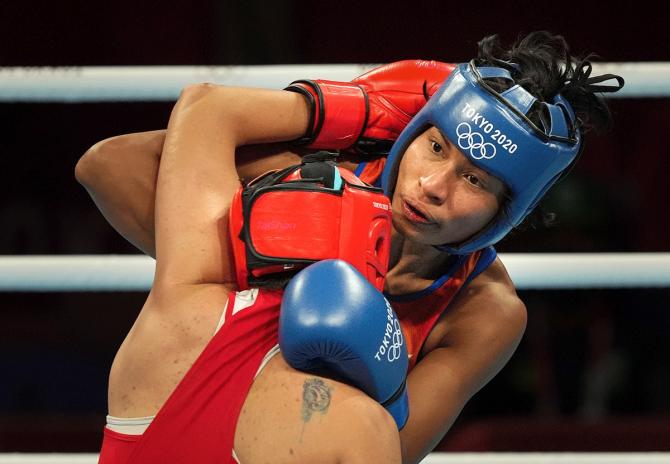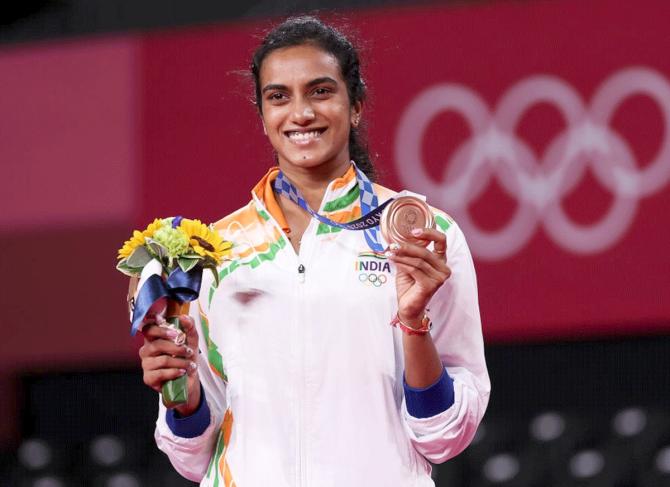'Everyone wants to get involved when there is success.'
'But what about guaranteeing it?'
'Making sure girls have the opportunity to succeed all the time?'
Vaibhav Raghunandan reports.

"When I was boxing, these goals didn't exist," Pranamika Bora says.
Bora, a boxer who represented India at multiple World Championships and the Commonwealth Games, now works as a coach at the Sports Authority of India National Boxing Academy in Rohtak, Haryana.
"We didn't even dream of the Olympics," she laughs, because the event wasn't even part of the programme.
"Growing up, it was tough as a girl to justify getting into boxing," she says.
"Your parents didn't want you getting into a sport where you get hit in the face. No Olympics meant fewer eyeballs, fewer jobs and less funding... It's not like today."
Nothing really is. Roll back the tape seven decades to see where we have come from.
Four women -- Arati Saha, Mary D'Souza, Nilima Ghosh and Dolly Nazir -- were part of a 64-member contingent to go to the 1952 Olympics in Helsinki.
They were the first women to represent India at that stage.
D'Souza, the oldest of the quartet, is 90 now, living in Atlanta with her daughter, spending her time playing whist and watching as much of the Olympics as she can on TV.
"I had talent, but no money," she recalls without a hint of resentment in her voice.
"The pressure was to get money to pay my way to the Games. There were obviously no advertisements and endorsements."
Sixty-nine years on, in Tokyo, at the hallowed Ryogoku Kokugikan, the temple of sumo wrestling where women aren't allowed, Lovlina Borgohain won India's third medal at the 2020 Games.
Her doing so means women have won seven of India's last 10 medals at the Olympics -- a run that coincidentally stretches back exactly nine years, to August 4, 2012, when Saina Nehwal won a badminton bronze.

August 4, 2012 was a big day for another big reason. It was the day, Bora insists, that women boxing in India changed forever -- with MC Mary Kom's debut at the Olympics.
Later that same year, in a dusty hall at the Barpathar Girls High School in Assam, the renowned SAI boxing coach Padum Boro spotted the girl.
Tall, lean and wiry, the teenager was training Muay Thai at the school, which gave her the movement and footwork necessary to negotiate the art of the ring.
Boro was part of SAI Guwahati's scouting programme, conducted to increase participation in boxing and select participants for the sub-junior nationals in Akola later that year.
That girl was Lovlina Borgohain. She was drafted in almost immediately, sent to SAI Guwahati, and from there to the national camp in 2018. With each step, her star has only grown bigger.
"Nowadays kids have access to the Internet, the phone, TV; they see everything. They see these girls fighting on the big stage at big events, winning medals, (and) show their parents this. It changes people's minds," Bora laughs.
"In our time, if you wanted to change minds, you came back with a medal."
A medal still turns heads. Borgohain's bronze has seen the state government of Assam finance the building of a road in her village immediately.
The petition was gathering dust for years. In many ways, this simple thing, the building of a road when the medal has been won, is symbolic of everything India still gets wrong when dealing with women's sport.
There is an unwritten rule: Succeed first, ask later.
"Every sport needs a role model. Someone to show the way," Bora says.
"It's not like Assam didn't have women boxers before. Kalpana Choudhury and I myself have represented India at various world meets. But it was different. The facilities, the coaching... and now with this medal, it will get even more different."

Bora may hold out hopes for change, but there have been others working at the grassroots who have seen this hullabaloo die out in the middle of Olympic cycles.
Adulation, recognition and support is extended for a few weeks every four years, before ebbing away and leaving them in the sun, toiling away.
"My demands have not shifted by an inch," Pritam Rani Siwach says, "Mai jo itne saal se maang rahi hoon, abhi bhi wahi chahiye."
Siwach, who captained India to the 2002 Commonwealth Gold, the inspiration in many ways to Chak De! India, runs a hockey academy in Sonepat, Haryana, mostly for girls from underprivileged backgrounds.
Three of her former pupils -- Neha Goyal, Nisha Warsi and Sharmila -- are in the Indian women's Olympic squad.
Right when they were selected in June this year, Siwach had expressed hope that the government would have paid heed and extended support to what she does.
"We have asked for funding for an astro turf and residential facilities. If they clear that, we will do all the logistics; we have it all ready..." she says.
A day after the Indian women qualified for the semi finals for the first time in history, Siwach's phone was flooded with calls from local leaders offering congratulations. "Each time I've only said, ab toh kar dena approve."
Undeterred though, Siwach insists no amount of negligence can take her away from what she does.
There is an inherent joy in working at the grassroots, moulding an unpolished talent into a professional.
Siwach asks that more be done to pay attention here. "If you neglect the sapling, the tree will not grow," she says.
"If you want women's sport to succeed, then give more support where it really matters."
In 1983, Shanti Mullick became the first (and to date, one of only two) women footballers to be awarded the Arjuna.
Mullick now coaches kids at the Rabindra Sarobar football stadium in Kolkata. For free.
The classes are co-ed; girls rub shoulders with the boys on the football pitch.
Support, in the form of equipment and kits, comes from the South Kolkata referee association.
Mullick doesn't ask for much but when asked, names at random multiple players at her coaching clinic, saying. "He's played for Bengal, she's played sub junior, she scored in the semis for Bengal at the Jr Nationals..."
Mullick refuses to be drawn into conversations about how seven medals may help women's sport in India.
"I've seen that before," she dismissively says. "Everyone wants to get involved when there is success. But what about guaranteeing it? Making sure girls have the opportunity to succeed all the time?"
These are hard questions. The medals will give birth to more.
Seven of 10. And even as you wrap your head around that statistic, the discrimination, harassment, patriarchal dominance and cultural subjugation log their own ever rising numbers without pause.
If sport is a reflection of society, then if there is one thing India can learn from the Olympics, it is this: Despite our slights, #GirlsGetItDone.
Feature Presentation: Rajesh Alva/Rediff.com












